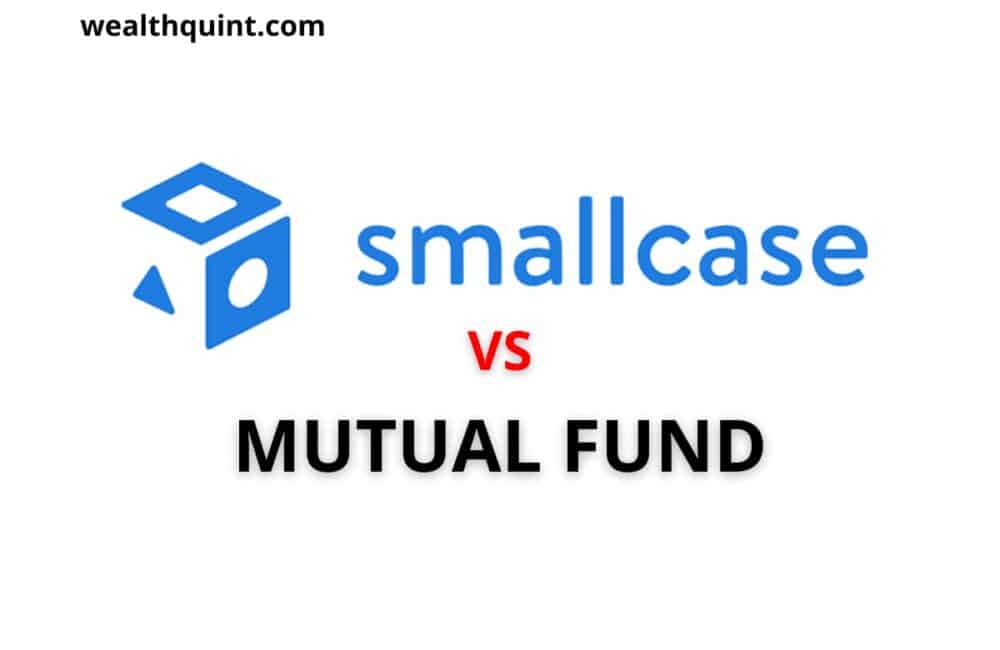Time is changing, and people are running towards multiple investment options. People are looking for new investment options for earning profits.
smallcase and mutual funds are good options of investments, but they work differently. In this blog, we will talk about the difference between smallcase and mutual funds.
What Is Smallcase?
smallcase is a group of stocks that are created by following a strategy to reflect the investment plan. There are different ideas and techniques involved to build smallcase. Investors can invest in smallcase if they want to invest in some specific sector.
What Are Mutual Funds?
It is an investment plan which contains a portfolio of stocks. There are different types of funds in which investors can invest their money and earn huge profits. In this investment scheme, people invest in multiple mutual funds and set their goals to get huge returns.
Smallcase Vs Mutual Funds: Tabular Comparision
| Parameters | smallcase | Mutual fund |
| Control over the investment portfolio | Gives better control over investments | No control over t5he investment portfolio |
| Portfolio diversification | Restricted diversification | Good diversification |
| Capital requirement | Moderate capital is required | Suitable for all kinds of investors |
| Expense ratio | Charges vary according to the case | Low expense ratio |
| Exit load | No additional exit load charges or lock-in periods | 1-2% as exit load |
| Holding pattern | Allows direct control | Limited control |
| Return volatility | Highly dependent on market’s performance | Offer stable returns of 8-12% |
| High risk | Comparatively riskier | Comparatively less risky |
| Taxation | Same as Mutual Fund | Same as smallcase |
Also Read: Is Investing Through Smallcase Safe?
Comparison Between Smallcase And Mutual Fund
1. Portfolio Modification
In smallcase are created by using a specific strategy so investors cannot diversify. Investors who want to invest in some particular sector, such as automobiles, can invest in smallcase. Investors can earn high profits by investing in smallcase, and they are created by SEBI professionals.
In mutual funds, investors can diversify for small capital investment. Investors can invest in many companies together according to their objectives.
Mutual funds offer excellent diversification, but it creates chances of high volatility. Mutual funds are best if you want to experience portfolio diversification benefits.
2. Handling Investment Portfolio
The investor smallcase shares are stored in their Demat trading account, which helps to handle the investments. With the help of a Demat account, investors can see their investments and exit from it whenever they want. They can handle and have full control of their investment portfolio.
When investors invest in mutual funds, they cannot control their investment portfolio. The investor has to choose either debt or equity depending on where they have invested their money.
3. Money Investment
If you want to invest in smallcase you have to invest more money than mutual funds. You will have to buy every share in smallcase to create a portfolio. Investors can also invest with less money through smallcase in exchange-traded funds. Investors need INNR 5000 to invest in smallcase.
If you want to invest in mutual funds, you need only INR 500 every month. Mutual funds are beneficial for investors who want to make small investments.
4. Exit Charges
Investors do not have to pay any extra charges to exit from shares in smallcase. There are no extra charges nor any duration to exit from it.
Investors who invest in mutual funds are given a lock period. If they exit from funds before the exit time, they will have to pay 1 to 2% exit charges. As compared to mutual funds, smallcases are more flexible in case of exit charges.
5. Expense Ratio
The fee taken for management services is called an expense ratio. If you invest in a smallcase, there is not a fixed expense ratio. Some smallcase is open for everyone, and some you can see only by subscribing.
Some smallcases are built by external companies, and in-house professional teams create some. The expense ratio in smallcase is not deducted from the investment amount. It will be deducted separately from the trading account.
You will not have to pay the expense ratio separately in mutual funds. The expense ratio will be deducted from the investment amount. However, the expense ratio depends on the types of mutual funds.
The amount gets deducted automatically from the investment, and it is around 11 to 2% only. The expense ratio is higher in smallcase as compared to mutual funds.
Also Read: Types of Mutual Funds & Their Benefits
Conclusion
Both smallcase and mutual funds want to create wealth for investors. Both have different methods but the same ideology. If you want to invest in smallcase, you should have knowledge and understanding of the share market.
Investors can enter and exit according to their choice. The expense ratio is low in mutual funds, and there is also a lock period. If you do not have much knowledge, go for mutual funds. Both work well, but you need more experience to invest in smallcases.



